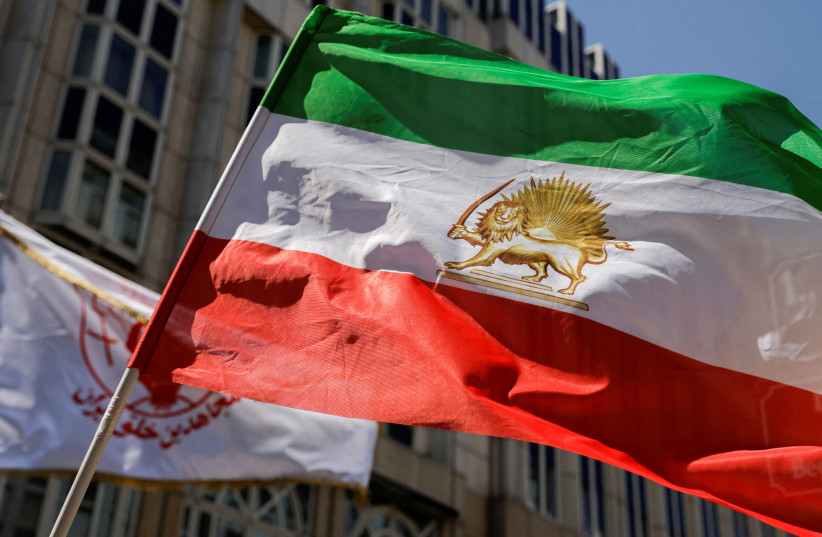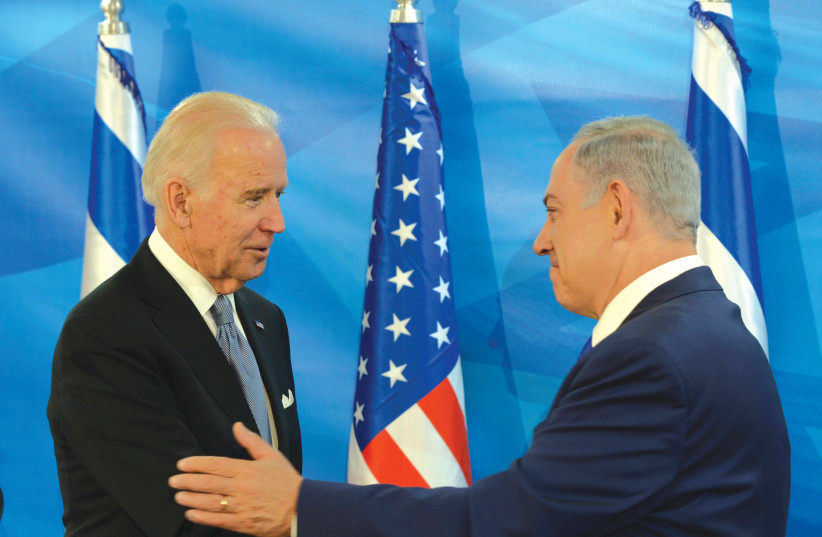In the 11th episode of The Media Line’s Spanish-language podcast, Medio Oriente 123, host Debbie Mohnblatt is joined by prominent American foreign policy adviser and lawyer Elliott Abrams.
For more stories from The Media Line go to themedialine.org
In a changing Middle East, with rapidly shifting dynamics, alliances, and strategies, US foreign policy seems to be changing as well. With the growing influence of China and the impression that the US is withdrawing on some level, new playground rules are being set.
To better understand the current American foreign policy in the Middle East, The Media Line spoke with Elliott Abrams, an American politician and lawyer, who has served as a foreign policy adviser for Presidents Ronald Reagan, George W. Bush, and Donald Trump.
Generally speaking, Abrams said, “my opinion is that the US is focusing on the Ukraine war and on the competition with China. And it seems like they do not want to invest so much in solving the problems of the Middle East.”
“But it is inevitable,” he added. Abrams believes the biggest regional problem that America should be focusing on is Iran, its foreign policy of aggression, support for terrorism, and nuclear program.

He criticized Biden Administration’s efforts to revive the nuclear agreement with Iran, calling it “a very stupid idea since it does not work. Not for us, not for our Gulf allies, nor Israel,” he said.
He argued that in any case, two years have passed since the negotiations started and it is evident that the Iranians do not want to revive the deal. “What is the US policy toward Iran?” he asked. “Nonexistent, in my opinion. There is no policy and, in the meantime, every month the Iranians keep progressing and getting closer to achieving a nuclear weapon,” he added.
Abrams recalled that President Joe Biden said two years ago, “They will not get a nuclear weapon on my watch.” But, he argues, there is no existing policy to avoid it—a huge weakness of America.
“Biden is maintaining most of the sanctions but it is evident that there are more oil exports from Iran to China,” he said, explaining that on paper, the sanctions are as strong as before, but in reality, they have significantly weakened as the Biden Administration has not confronted China over its importations of Iranian oil.
Abrams claims that Biden is probably the fifth US president who has said the US will never allow Iran to get a nuclear weapon. “If it achieves it,” he said, “the first consequence will be that the word of American presidents will not have value. That is very important for the US internally and for all of our allies in the world,” he said, adding that the same goes for Israel as most prime ministers have also promised that Iran will not acquire nuclear weapons.
Iran is getting close to the final stages
“But it is evident that Iran is getting close to the final point,” Abrams stated, adding that he does not know what President Biden will do, “but I think that Israel will act. Meaning that they will attack the nuclear program so it cannot be completed,” he continued.
Looking at the shifting balance of influence in the Middle East between the US and China, Abrams says that in part, it is a natural consequence of the growth of China’s economy and influence on a global level.
In addition to this, he says, there is a general impression among Middle Eastern countries that the US wants to withdraw from the region. “I think that it is a very exaggerated view, but it is part of those countries’ reasoning,” he said.
In this context, he referred to the Saudi-Iranian agreement mediated by China, which was signed in March. “In my opinion, the Saudis are hedging. They do not know if they can trust American guarantees, so they are trying to avoid the possibility of an Iranian attack,” he said.
He argues that with this deal, and with Chinese participation, the Saudis have lowered but not eliminated the chance that Iran will attack them.
The Arabs’ lack of trust in their American allies’ guarantees is based, among other things, on the absence of a reaction from Washington when Iran attacked Saudi assets in the past, Abrams argues, citing the Iranian attack on the Abqaiq Saudi petroleum facilities during the Trump Administration, and the lack an American response.
“There are people in both American parties who are isolationists,” Abrams noted, adding that in Congress, the Democratic isolationists are more powerful.
He attributes this common opinion among American politicians to the experiences in Afghanistan and Iraq. “There are many people, even in Congress, who say that we have lost too many lives, spent too many dollars, and expended too much effort and have gained nothing,” he said, adding that he does not share this opinion.
The challenge of China
Abrams says another possible reason for the reduction of American activity in the Middle East is the need to deal with the challenge that China poses. “There are people who claim that in the 21st century, the one and only challenge for America is China,” he said.
Many others connect the decline in Washington’s activity in the region with the decreasing importance of oil on a global scale. “The petroleum claim is exaggerated in the sense that, yes, in the year 2050 may be true, but in 2030, no,” Abrams argues.
However, he notes the fact that petroleum will be less important in the future, and also that the US is more or less independent as it currently produces and consumes similar amounts of oil. “These two facts leave the impression that the Middle East will be less important financially and commercially in the future,” he added.
Withdrawing from Afghanistan was probably the biggest step taken by the current administration in terms of pulling out of the region. “There is a huge majority of Americans who believe that the way in which America left was terrible. We have abandoned thousands of people who worked with us there,” Abrams said, claiming that this affects how Afghanistan’s neighbors, such as Pakistan, view America’s power.
The impression that America is leaving the Middle East, added Abrams, affects Israel’s status among its Arab neighbors. He explained that in the last few decades, “Arabs have seen Israel as a country that has lots of influence in Washington,” he said. “Now that they see that President Biden does not want to invite Israeli Prime Minister Benjamin Netanyahu to the White House, their reaction is logical,” he said, noting that the Arab states may read that Israel has less influence in Washington, so they do not need Israel’s friendship as much.

Also, he pointed out that many Arab nations, thinking about their security, project this alliance between Israel, Arab nations, and America. “If that starts to seem unachievable, it affects their attitude toward Israel as well,” he noted.
On the other hand, said Abrams, Saudi Arabia trusts that Israel would confront Iran if necessary, as Iran is a common enemy for both countries, even if Saudi Arabia does not recognize it, Abrams claims.
Still, he does not believe that this will lead the Saudis to join the Abraham Accords and normalize its relations with Israel for the time being. Riyadh, he said, has “what they want,” which is the unofficial security cooperation with Israel. “But my experience with the generation of Saudi King Salman tells me that they have a very positive sentiment toward Palestinians,” he said. “I believe that while the king lives, they will not get any closer to Israel, at least formally,” he added.
When Mohammed bin Salman’s time to be king comes, Abrams believes that there will be normalization. But still, he believes that it will require intense negotiations as Riyadh has requested several things from the US that it has not obtained, and normalizing relations with Israel could be good leverage for MBS to get them.
Israel's relations with Indonesia
After Saudi Arabia, the most important country that Israel can normalize its relations with would be Indonesia as it is the biggest Muslim country, population-wise, Abrams points out. “But my impression is that they want to normalize with Israel after Saudi Arabia, not before,” he said.
If in five or 10 years, Israel has normalized relations with both Saudi Arabia and Indonesia, “Wow! It would be a great historic achievement,” Abrams added.
Alongside the Arab normalization with Syria, the US is alienating itself from its allies in the Middle East as it will not establish official ties with President Bashar Assad as its Arab partners recently did, Abrams says.
Of that situation, he said, “I blame President Barack Obama. We had opportunities to oust President Assad. Everyone remembers Obama’s red line on chemical weapons, and then he did nothing,” he said. On the other hand, he understands the Arab nations’ reasoning. “I do not blame the Arab nations because Syria exists, Assad is still the president, and he has power. And it was evident that one day they would normalize their ties with Syria,” he noted.
With the American elections in 2024, changes in American foreign policy are yet to be seen, he said. “If Biden wins again, we know what his foreign policy in the Middle East looks like. Unless Iran gets closer to the nuclear weapon and Biden decides to act,” he added.

On the Republican side, said Abrams, “we have to see if it will be Trump or not. My impression is that [Ron] DeSantis, who seems to currently be the most likely alternative to Trump, would have great support for Israel.” If it is Trump, he continued, “it is hard to know, but he used to support Israel, as well,” he said.
For any of the candidates, he continues, it remains a question of what would be the American reaction if Israel decides to attack Iran’s nuclear program.
